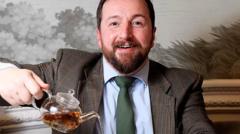Did a Fraudster Get Jailed for Peddling Fake Scottish-Grown Tea?

The Intriguing Story of Thomas Robinson: The Tea Fraudster
The tale of Thomas Robinson, also known as Tam O' Braan, is a compelling reminder of how far some will go to deceive others for personal gain. This 55-year-old fraudster was recently sentenced to three-and-a-half years in prison for orchestrating an elaborate scam involving luxury hotels and tea enthusiasts. Over five years, Robinson sold what he claimed was "Scottish-grown tea," which was, in reality, imported from abroad. His story is not just about the crime itself, but about the impact of deception on an entire industry and the lengths to which individuals will go to protect their fraudulent enterprises. This article delves into the details of Robinson's fraudulent activities, the consequences of his actions, and the broader implications for the tea industry in Scotland.
Robinson’s Elaborate Scheme
Robinson's scam spanned from 2014 to 2019, during which he duped high-end customers, including prestigious hotels like the Balmoral in Edinburgh and the Dorchester in London. He sold various tea blends, such as Highland Green and Scottish Antlers Tea, while claiming they were cultivated on Scottish farmland. However, these claims were fabricated; the tea was instead sourced from wholesalers in England, likely imported from tea-producing countries like Sri Lanka and India.
The False Promises of Scottish Tea
Robinson's audacity extended beyond luxury hotels. He also targeted aspiring tea growers, selling them plants he falsely claimed had been "specially engineered" to thrive in Scotland's climate. In reality, these plants had been purchased cheaply from a horticulturist in Italy. Many of his customers, who believed they were investing in a burgeoning Scottish tea industry, ended up with failed crops and significant financial losses.
The Impact on the Tea Industry in Scotland
Robinson's fraudulent actions have had lasting repercussions on the Scottish tea industry. By misrepresenting the authenticity of his products, he not only defrauded individual growers but also contributed to skepticism about the viability of tea production in Scotland. Genuine tea growers were left grappling with the fallout of Robinson's deceit, which has made it harder for them to establish credibility and build trust in their products.
The Voices of Victims
Richard Ross, one of the victims who bought 500 plants from Robinson, shared his frustrations after discovering the truth. He noted that genuine tea plantations were never involved in supplying the Balmoral Hotel, highlighting how Robinson had stolen the identities of legitimate growers to bolster his own reputation. Islay Henderson, another victim, expressed her disappointment after purchasing 1,500 plants, believing they were selectively grown for Scottish conditions. The disillusionment among these growers reflects the broader impact of Robinson's actions, as trust in the industry was severely undermined.
How Robinson’s Fraud Unraveled
The unraveling of Robinson’s scheme began when authorities received complaints from genuine tea growers who were puzzled by the presence of Robinson's tea on luxury hotel menus. Perth and Kinross Council initiated an investigation into whether Robinson held a food processing license. Food Standards Scotland (FSS) soon became involved, and lead investigator Stuart Wilson revealed that it took little time to uncover the truth behind Robinson’s claims.
The Investigation Process
- Initial Complaints: Concerns were raised by real tea growers about Robinson’s fraudulent activities.
- Investigation Initiated: Perth and Kinross Council began examining Robinson’s business practices.
- Involvement of FSS: Food Standards Scotland took over the investigation, uncovering the true origins of the tea.
- Evidence of Fraud: Authorities discovered that the plants Robinson sold could not have been cultivated in the quantities he claimed.
The Court Proceedings
During his trial, Robinson maintained his innocence and concocted a series of elaborate backstories to support his claims, including dubious credentials as a chemist, scientist, and bomb disposal expert. However, the jury saw through his fabrications, leading to a conviction for fraud amounting to £550,000. Sheriff Keith O'Mahony emphasized that Robinson’s actions were far from victimless and involved significant planning and deception.
The Role of Media and Public Perception
Robinson’s story captivated the media and the public alike. His ability to weave an engaging narrative about his life, including claims of living in the Amazon and inventing the "bag for life," drew attention and even led to features in prominent news outlets. However, this media spotlight also contributed to the eventual scrutiny that exposed his fraudulent activities.
Consequences and Reactions
In the wake of Robinson's deception, both the Balmoral Hotel and other high-end retailers have tightened their procurement processes to prevent future fraud. Andrew McPherson, the general manager of the Balmoral, expressed profound disappointment and embarrassment over being misled, emphasizing the hotel’s commitment to supporting local Scottish food producers.
Lessons Learned
- Importance of Verification: The case underscores the necessity of verifying claims made by suppliers, especially in niche markets like tea.
- Protecting Genuine Producers: The industry must work collaboratively to protect legitimate producers and rebuild trust.
- Consumer Awareness: Educating consumers about the origins of their products can help combat fraud.
Moving Forward
As Robinson serves his sentence, the Scottish tea community is slowly recovering from the damage his actions caused. Genuine tea growers are working to regain the trust of consumers and investors, emphasizing the authenticity of their products. Initiatives like Tea Scotland are actively promoting the cultivation of tea in Scotland, showcasing the potential for a thriving industry built on honesty and quality.
The Future of Tea Growing in Scotland
The experience of Robinson’s victims serves as a cautionary tale for both consumers and producers. Moving forward, the Scottish tea industry must focus on transparency and collaboration to ensure that such fraud does not occur again. If the industry can unite and promote genuine Scottish tea, there may still be a bright future ahead.
FAQs
What motivated Thomas Robinson to commit fraud?
Robinson was motivated by financial gain, exploiting the growing interest in Scottish tea and the willingness of consumers to pay a premium for local products.
How did the authorities uncover the tea fraud?
Authorities uncovered the fraud after genuine tea growers raised concerns about the legitimacy of Robinson's claims, leading to an investigation by the Perth and Kinross Council and Food Standards Scotland.
What lessons can be learned from this case?
This case highlights the importance of verifying supplier claims, protecting genuine producers, and educating consumers to prevent fraud in niche markets.
Conclusion
The saga of Thomas Robinson is a stark reminder of the vulnerabilities within niche markets and the lengths to which fraudsters will go to exploit them. While Robinson’s actions caused considerable harm, they also sparked a renewed commitment among genuine tea growers to uphold the integrity of the Scottish tea industry. As the dust settles, one can only hope that this incident serves as a catalyst for positive change, transparency, and collaboration among producers. In a world where authenticity is increasingly prized, the future of Scottish tea may be brighter than ever—if pursued with honesty and respect for the craft.
How can the Scottish tea industry rebuild trust and ensure authenticity in the future? #ScottishTea #FraudAwareness #AuthenticityMatters
Published: 2025-06-25 14:18:28 | Category: technology



